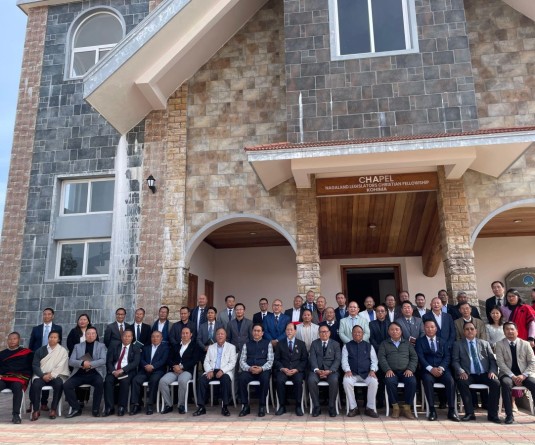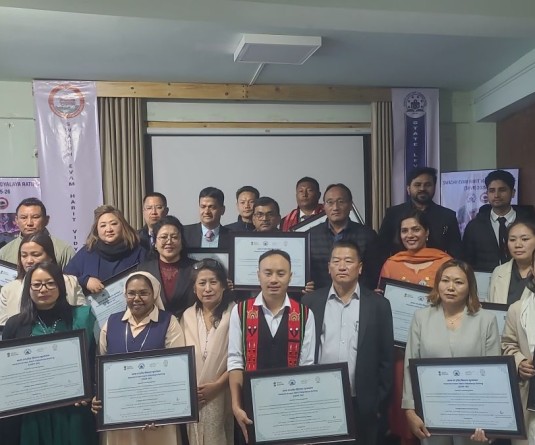The Committee on Review of Reservation Policy (CoRRP), representing five Naga tribes—Ao, Sema, Lotha, Angami, and Rengma—held a sit-in protest outside the Nagaland Civil Secretariat on July 9. (Morung Photo)
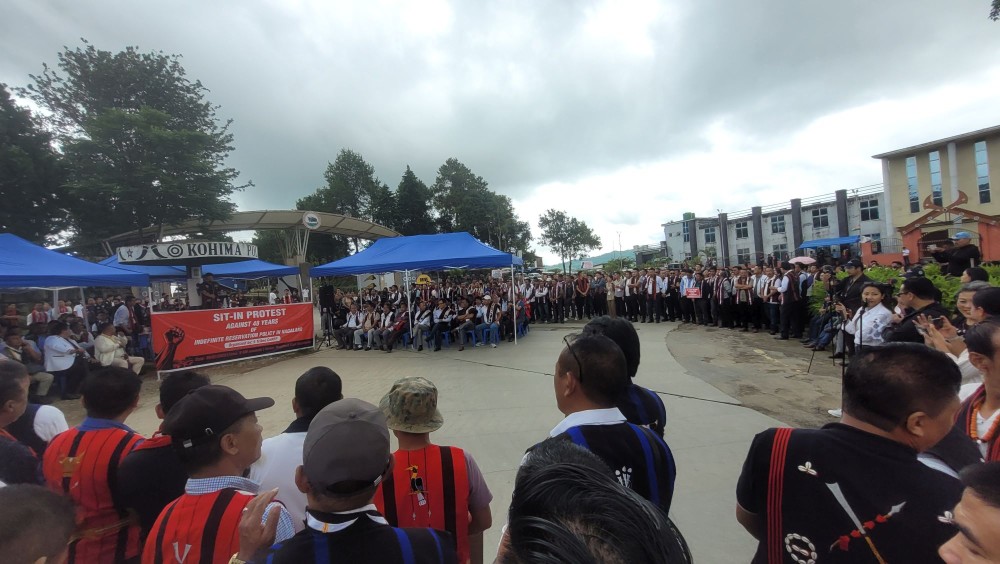
CoRRP stages sit-in at Nagaland Secretariat, demands review of reservation policy
Morung Express News
Kohima | July 9
The Committee on Review of Reservation Policy (CoRRP), representing five Naga tribes—Ao, Sema, Lotha, Angami, and Rengma—held a sit-in protest outside the Nagaland Civil Secretariat on Wednesday, questioning the government’s continued delay in reviewing the state’s reservation policy, which has remained unchanged since its introduction in 1977.
With placards reading “Stop BT reservation from becoming an inheritance policy,” “BT reservation with double benefits & flexible options has destroyed merit,” and “Next census is an excuse to prolong indefinite BT reservation,” protestors gathered to express concern over what they termed a discriminatory and outdated policy framework.
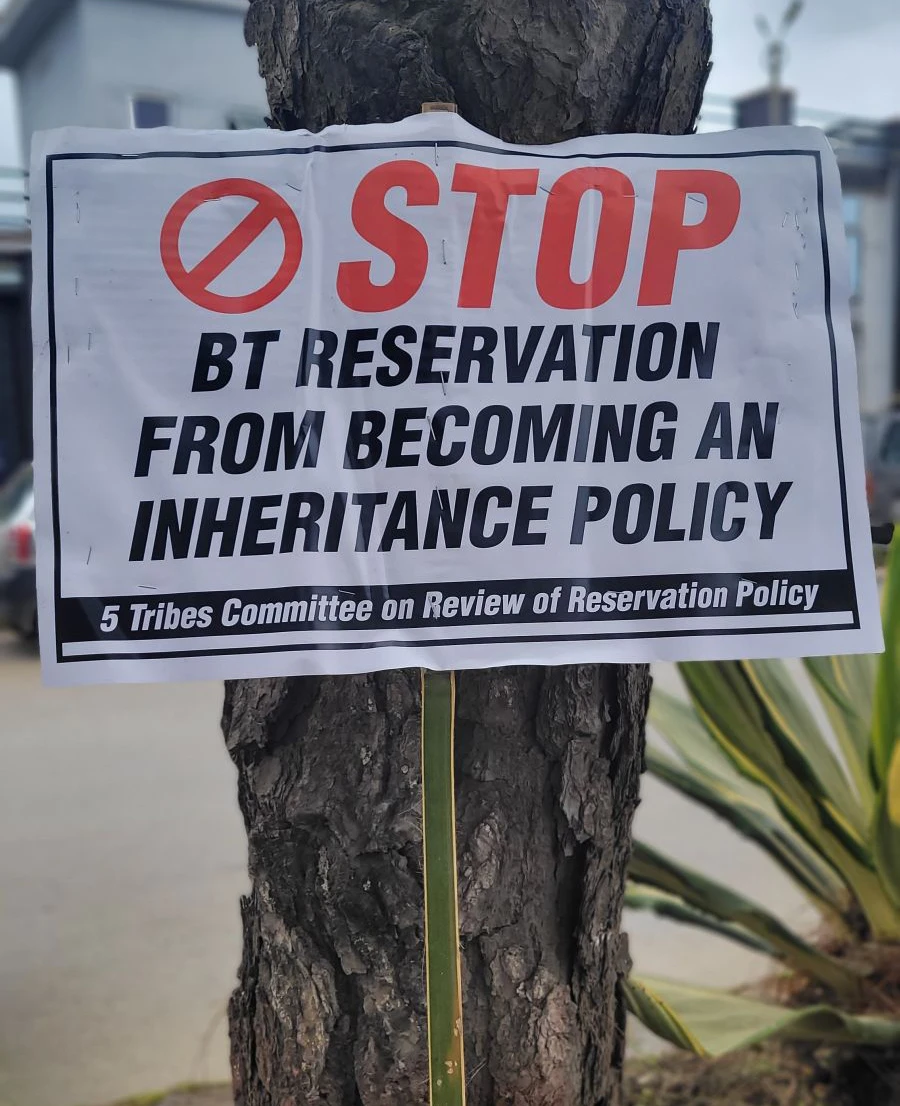
The protest, organised by CoRRP under the mandate of the five apex tribal hohos, is the latest in a series of public actions demanding a comprehensive and fair review of the reservation system in Nagaland. CoRRP leaders clarified that their movement is not directed against any community or tribe, but rather aims to uphold democratic rights and fairness for all.
Timeline of Protest Movement
Speaking at the protest, Er. Tesinlo Semy, Convenor of the 5 Tribes CoRRP, asserted that the committee is acting on a long-ignored issue. “We are here to speak truthfully, boldly, and firmly on a matter that has long been left ignored. We represent the deep concerns and rightful aspirations of our tribes,” he said.
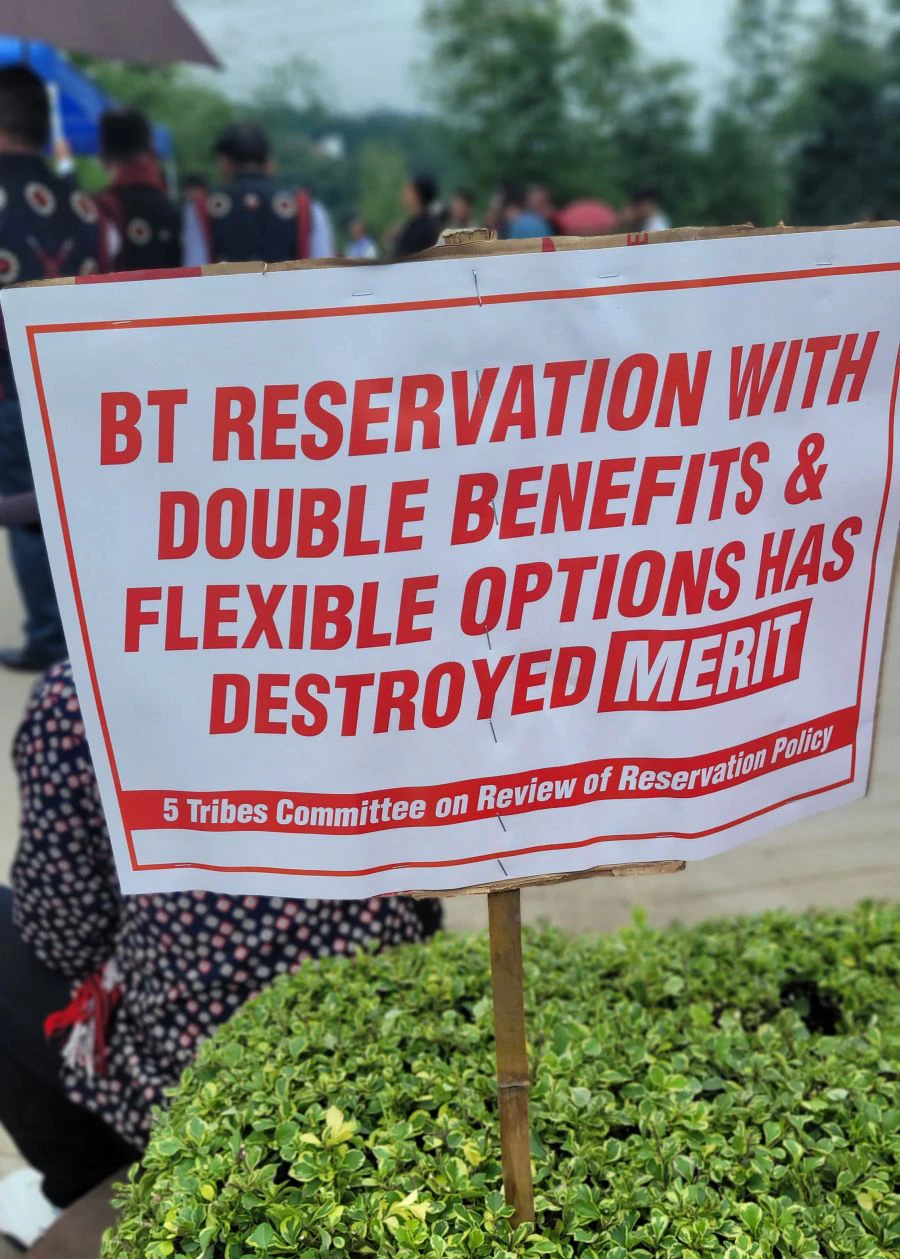
Semy explained that a memorandum was submitted to the Government of Nagaland on September 20, 2024, demanding either the scrapping of the current reservation policy or a fair re-allotment of the unreserved quota to the five tribes. With no response from the government, CoRRP issued a 30-day ultimatum on April 26, 2025, which also went unanswered.
In response, CoRRP launched the first phase of its democratic agitation through public protest rallies held across all eight districts of Nagaland on May 29, 2025. “Our protest was peaceful, dignified, and united in message: Enough is enough,” Semy said.
Following the rallies, the State Government convened a joint meeting with the five tribes at the Chief Secretary’s conference hall on June 3, 2025, during which officials assured that a decision regarding the formation of a review commission would be conveyed within a fortnight. Action on CoRRP’s demands was promised within a month.
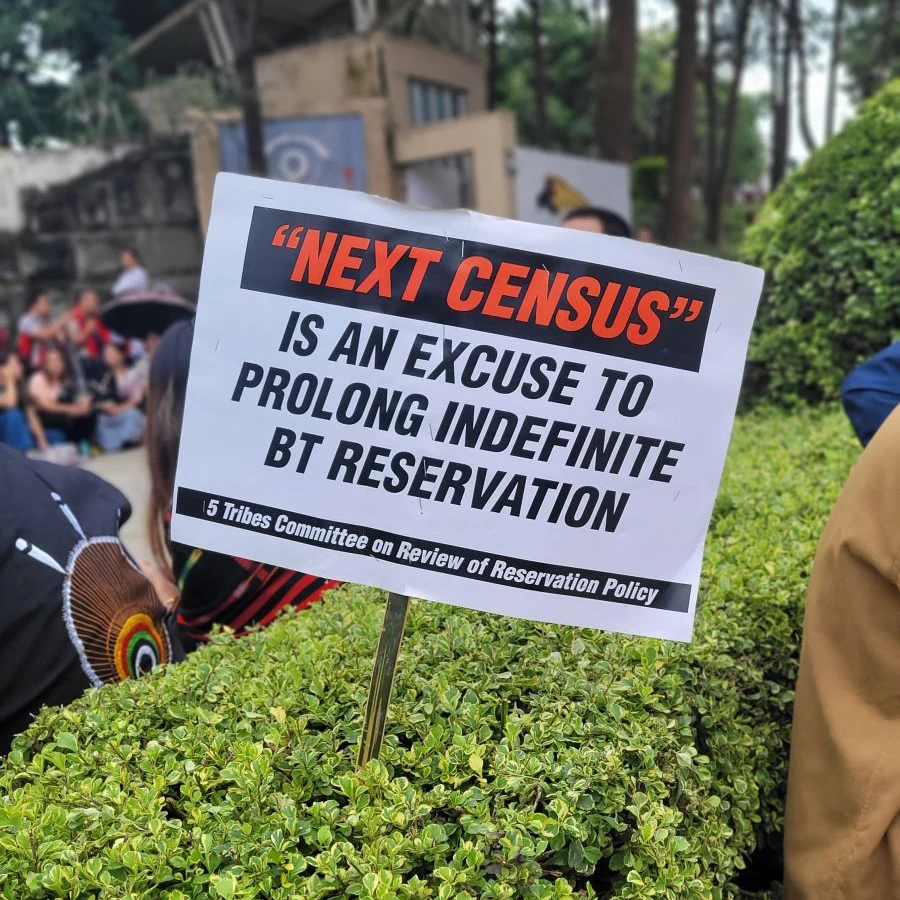
“Today, more than a month has passed. There is no notification, no update, and no action. Are we to conclude that this issue is not a priority for the Government?” Semy asked. “Worse still, we have come to learn that the Government now intends to wait for the next population census in 2027 before addressing the issue. Are we expected to sit quietly for another three or four years? Does this mean we will celebrate 50 years—a Golden Jubilee—of a flawed and unreviewed policy?”
“How long is too long?”
Semy highlighted that the reservation policy, originally intended to uplift backward tribes, has remained untouched for nearly five decades. “We have supported and allowed time for the implementation of the Nagaland Reservation Policy in the spirit of brotherhood and solidarity, hoping it would uplift those in need. And indeed, it has enabled several backward tribes to rise, sometimes even surpassing the so-called ‘advanced’ tribes,” he said.
However, he questioned the indefinite continuation of the policy. “How long is too long?” he asked, pointing out that the policy was designed for periodic review every ten years.
He criticised a 1989 government notification which stated that the “existing policy will continue until further orders,” calling it a “vague declaration” that has led to an indefinite extension of the policy. “Is this what was envisioned? A policy that, by now, should have evolved, revised, or concluded, has instead become permanent by neglect.”
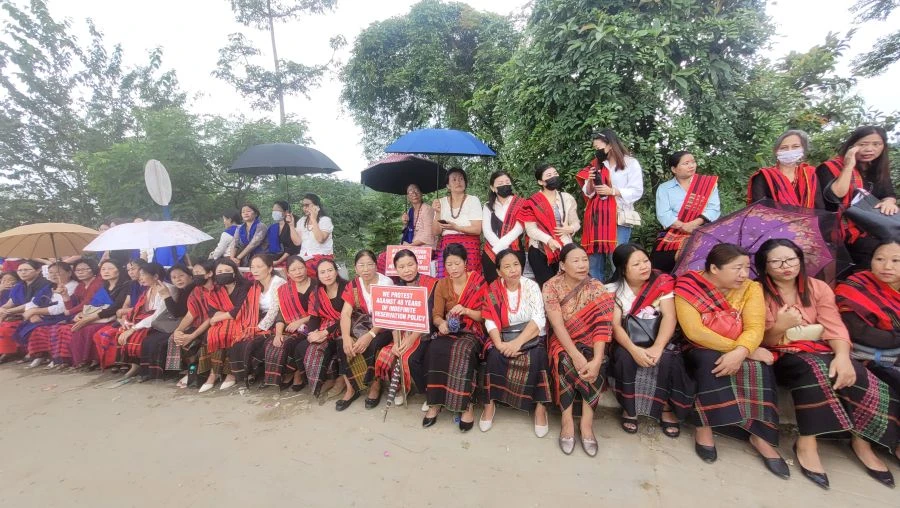
Semy further alleged that although several committees had been formed over the years to recommend changes to the reservation policy, their reports have remained unimplemented. “Their reports lie in cold storage, gathering dust, and the concerns raised have gone unheard, except for a few token adjustments.”
Core Issues and Systemic Flaws
Semy outlined key flaws in the current policy, including the lack of a fixed duration, introduction of internal reservations, multiple benefits, flexible category options, absence of creamy layer exclusion, and discrepancies in age relaxation and cutoff marks.
He cited a specific example from the education sector where 47 teaching posts remain vacant due to an insufficient number of qualified candidates from reserved categories. “These posts are advertised and re-advertised every year to no avail, while deserving and qualified candidates from our tribes are denied the opportunity to serve,” he said.
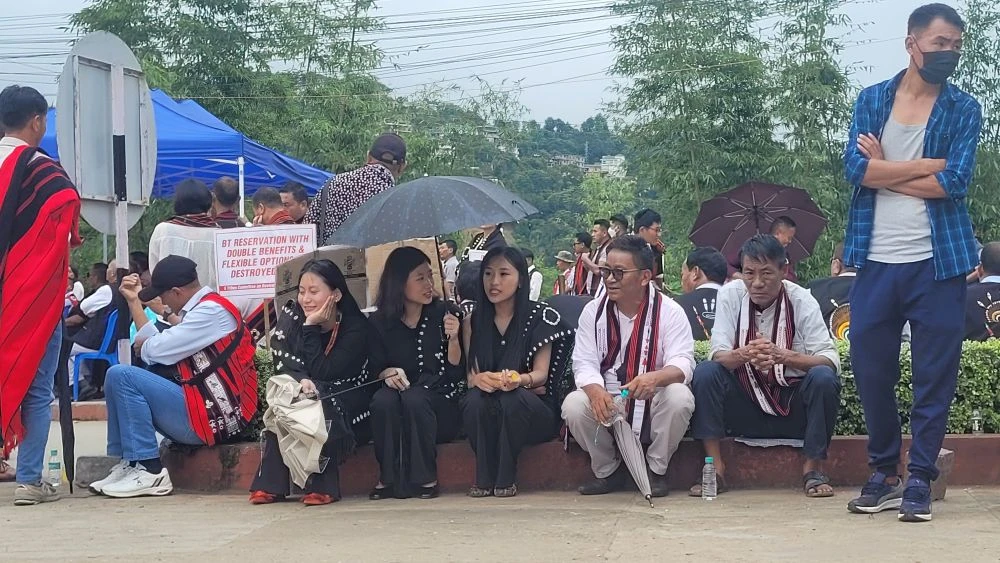
Semy asserted that reservation should be based on economic and social backwardness, not merely tribe identity. “Many people in pocket areas, regardless of tribe, face real hardship. But this policy does not reach them.”
He also questioned the continued classification of tribes in Nagaland—where all are recognised as Scheduled Tribes—into “Backward” and “Advanced” categories, calling it “unjust, discriminatory and divisive.”
“Do not delay justice”
Reaffirming that the protest is grounded in fairness, Semy stated: “We are gathered here today, not out of anger, but out of conviction. We are not here to create division, but to restore fairness.”
He urged the State Government not to delay justice any longer, stating that a decision could be made by the State Cabinet if there was political will. “We want a Nagaland where every tribe is treated fairly. Where merit, equality and opportunity are not sacrificed at the altar of outdated policies,” he said.
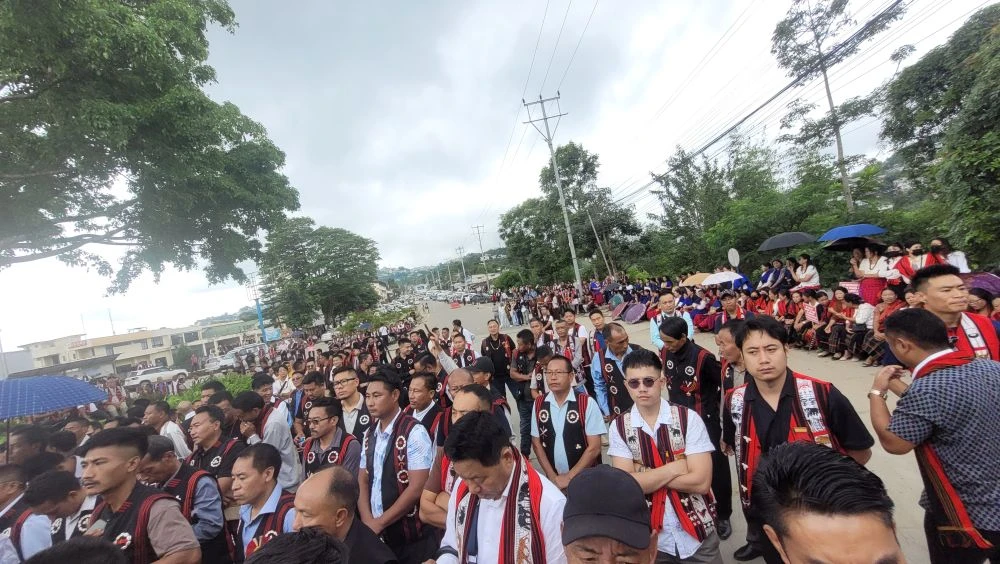
Leaders from the five tribal bodies reiterated their solidarity, stating they are “ready and committed” to pursue the movement until their legitimate rights are recognised. “We are against any form of deprivation and segregation,” they affirmed.
Meanwhile, the CoRRP has expressed gratitude to all supporters following the successful conduct of its one-day sit-in protest at the Nagaland Civil Secretariat in Kohima on Tuesday, reiterating its commitment to seek a review of the state’s 48-year-old reservation policy.
In a statement, CoRRP acknowledged the unwavering support of the five apex tribal bodies—Angami Public Organization, Ao Senden, Lotha Hoho, Rengma Hoho, and Sumi Hoho—along with youth and student bodies of the five tribes. Special appreciation was extended to the Angami Students’ Union for organizing logistical arrangements for the protest.
The committee also thanked the district administration and law enforcement agencies for maintaining security and ensuring smooth traffic management during the peaceful gathering.


